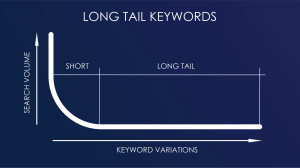Introduction
The keywords make a great difference to good SEO in digital marketing. They connect what a person searches for in a search engine to a content piece you have to offer. When a person knows about the different types of keywords, he will understand better how to search engine optimize as well as create content. Knowing all the different types of keywords will enable one to make his strategy stronger. One is expected to reach many people, increase their search rankings, and work toward their business goals by proficiently using these concepts.


What Are Keywords in SEO and Why Do They Matter?
SEO keywords are words or groups of words people type in search engines to enquire about information about something. These are precisely the terms you want your website to pop up for in the search results. The heart of good search engine optimisation is to marry your quality content with the kind of search engine keywords being used by your intended audience. When you do this well, your site ends up being shown more, thereby bringing in good traffic and genuine customers. This is what matters here because, without this part, you won’t have a particular focus for your proper SEO efforts.
Effective keyword research is more than just gathering high-volume words; it also involves knowledge of the context and meaning behind the terms people type in. One must use proper keywords in the content, title, and meta-description levels so that search engines understand what the page is about. It is important because it makes the page rank high in search results. This further connects to customers who are looking for what one has to offer.
Definition and Evolution of SEO Keywords
Keywords used for SEO refer to important search terms or phrases which a person plugs in when searching for something on a search engine. These phrases are largely used for targeting purposes in the aspects of SEO work without necessarily using page optimization techniques. The main aim of SEO was simple keyword usage across a page to show search engines that a page was about that term.
This is not how the search engine optimization runs today. In 2013 Google was able to create an update called Hummingbird. After that search engines became smart. They began to look not only for single keywords but also for meaning and context for each page. Since then, time has introduced other new inventions such as RankBrain and BERT. These tools can read whole phrases by Google. This also helps in finding what is intended when someone uttered something in the search bar.
This means that one cannot just sprinkle some keywords in the content and sounds expecting high returns. Now, keywords are important tokens that indicate what your page is about; their proper use helps search engines to reveal what your content is. This is still very important even in experts’ opinions, if you want your page to rank well.
The Role of Keywords in Search Engines
The keywords help know what the page is; they serve as the main bridge between a person’s search and the internet. For example, when writing, there is no need or consideration to not include specific keywords in what you write; tell Google or any other search engines what your page covers.
This signaling process will affect the ranking of your keyword. The search engine refers to your page to find out whether it duly matches the search query. It will then check whether it is a good source in the field where people are looking for information. Some people consider if it is fair to believe that the content will help, as it shows your page when searching. It could place you to the first page.
The target is to achieve a higher position for the keywords concerning your business. The better your keyword position, the more visible your website is; consequently, it receives the desired benefits. That said, the more visibility a website has, the more organic traffic that website gets, which is just what you want. These people are much more likely to buy from you.
How Keywords Influence SEO Strategy
Keyword selection—the foundation of every great SEO plan. Next comes keyword research—the first step to improving your site. It tells one what the target audience is looking for and what words they are using while searching.
Having identified relevant keywords for your industry, you then get to build your content around what your customers want and need. It means you generate content that is useful to real people and not just spam for search engine bots. Picking the right keywords tells you what your content ought to be about. It also guides you on what to write about throughout the whole process.
In the end, the keywords you have selected will pave the way for your SEO strategy. Consider your intent. Do you want to build brand awareness, generate leads, or push for sales? All of these require different keywords. A good SEO strategy starts by knowing which keywords will bring the right people to your site to achieve your business goals.
Understanding Keyword Classification by Search Intent
A good place to start grouping keywords is to determine search intent. Search intent, or user intent, is basically the supposedly big study reason someone types in a search query. Once you are aware of your audience searching for something, you can put together content that responds to that inquiry. The key is to match your content with what people need, which is quite an SEO strategy.
With the aid of intent, keywords are split into four types: mainly informational, navigational, commercial, and transactional. All these keyword types get matched with at least one step of the user’s journey. In this respect, a person would check facts, then decide to buy something. This is how it connects with each keyword type: We get one after the other. In this section, let us clearly look at these keyword types.
Informational Keywords
These keywords are informational keywords that people use whenever they need to get insight about something. They type these when they want to get their problem or question answered. The search intent is to get information in this regard-the person asking these questions is just beginning to look for what he or she needs. The aiding step or the first step in the buying journey is taken up by these questions.
The best way you can do content marketing is by generating even better content using informational keywords. These keywords, from a sales point of view, might not give you any returns. But when you start being searched for in relation to these keywords, people will begin seeing your brand as the most preferred option for the job in your industry. They will start trusting you if you get out there and help them with useful information rather than just trying to sell them something. With this helps, over time they will find your brand interesting.
Navigational Keywords
Navigational keywords help users find a targeted website or a particular page on such website. Most people simply use a search engine for this rather than typing the whole link of the website. A query like this typically contains the name of a brand or product or service.
It is very important for your business that customers are able to find you easily as they carry out searches for your navigational keywords. To do this, your brand name and product names should be in the text, meta tags, and schema markups. Ensure that they stand out and are easily visible.
Commercial Keywords
Commercial keywords indicate either looking for products, services, or brands by someone for possible purchase shortly. Mostly, the purchases are looked at, with the checking of competition websites, reviews, or advice before finalizing the decision. Thus persons going for the keywords that are more commercial can be seen as good opportunities to make a sale.
Targeting this type of keyword through comparative posts, complete reviews, and proper breakdown appears to work effectively. Inasmuch as some commercial keywords attract high volume and competitiveness, there can still be good conversion rates. This is so because persons using these keywords for searching are way further along in their buying cycle, thus enhancing the probability of closure once they read info on that type of keyword.
Transactional Keywords
One thing that could be said concerning these keywords is that they imply maximum buying intent. One can either buy or sign up or download a product or service when using these keywords. These keywords are mostly found at the bottom of the sales funnel and thus are very valuable for conversion value.
These keywords with the best intent for the purpose of sale will greatly influence the landing page, product pages, and pages for paid search. When you get positioned for a keyword that people search for when they want to buy, you’re getting visitors that are ready to take action. This means the right people descend directly onto your landing pages and are now very likely to buy or sign up.
Keyword Types Based on Length
They are grouped based on how many words they have and on search intent. There are three main types of keywords: short-tail, mid-tail, and long-tail. The length of the keyword usually indicates how specific it is; it can also indicate the search volume and competition for that keyword.
The distinction between short-tail and long-tail keywords is important in your keyword planning. Short-tail keywords are useful for drawing many visitors to your site. In contrast, long-tail keywords typically have a much higher conversion rate. In the next section, we will look at both types and how they work in your SEO plan.
Short-Tail Keywords
Short-tail keywords are easy phrases of one or two words for search. The target audience uses these keywords to express interest in a topic or a business. They are usually the first words that come to mind to describe something. This being the more generic term, many people use it, so it has a huge search volume.
This popularity brings with it a major disadvantage. There is a pretty stiff level of competition with regard to these searches, so ranking for short-tail keywords is no easy task. New or smaller websites have a hard time with this. In those situations, you will see that large brands, which have been in the business for quite some time, usually occupy the higher positions for these broad match terms.
Long-Tail Keywords
Long-tail keywords are searched with three words or more, often very specific and detailed. From your experience, they have lower search volume, while they do not deliver a lot of traffic per se; a lot of good things can still come from them.
Long-tail keywords are highly specific, which means the competition is less for these. Therefore, smaller sites find it much easier to rank in these keywords and gain organic traffic. Also, when someone searches with a long-tail keyword, the user’s intent is clearer. The person doing a specific search knows what he wants from the very beginning.
Mid-Tail Keywords
There are about two or three words in mid-tail keywords. They have an associated ample search volume and keyword difficulty. They are neither too narrow nor too broad, giving them high sound results when applied.
It is not as encompassing as short-tail keywords, so competition is less. It brings a focused target audience, while the search volume is higher than for very specific long-tail keywords. This helps to reach broader audiences while keeping the focus quite clear.
Other Essential Keyword Categories in SEO
New SEO practices go beyond just intent and length; understand the many keyword types that exist today. These keywords will sweep some content with their consideration. Besides, they let you look into more topics to help ensure your pages are matching search engines. By understanding these keyword types, you can form a better keyword strategy for your site.
Seed keywords are those used to initiate research. Related keywords supplement the completeness of your content. Each type of SEO keyword is important and plays a particular role. Now, let’s look into some other vital SEO keywords that you should know, related to them.
Seed Keywords
Seed keywords are the root of your research on keywords. They are short and wide. Most of the time, a seed keyword is one or two words. These are the words that tell about your main topics. Seed keywords are like the starting point. Everything else in keyword ideas comes from them.
Usually, you don’t work on optimising your pages using seed keywords since they are too broad and competitive. The main reason for using seed keywords is that they help you in keyword research. You put them for keyword research into the keyword suggestion tools, and you will get more focused keywords. These may be long-tail or mid-tail keywords more easily targeted
Conclusion
Well, toward the end, it becomes vital for the SEO strategy to understand different types of keywords. Once you recognize the differences between informational, navigational, commercial, and transactional keywords, you can prepare content more in line with what a person would want to search for. That will help you get ranked higher.
It is good to know about keyword length, branded keywords, non-branded keywords, and special words for your area. These can make your whole keyword research better. Using good keyword research tools also makes the work faster and easier.
To help your SEO strategy and achieve new results, get a free consultation. A team will assist you in piecing together a plan tailored to your business needs that will help you achieve your goals.



